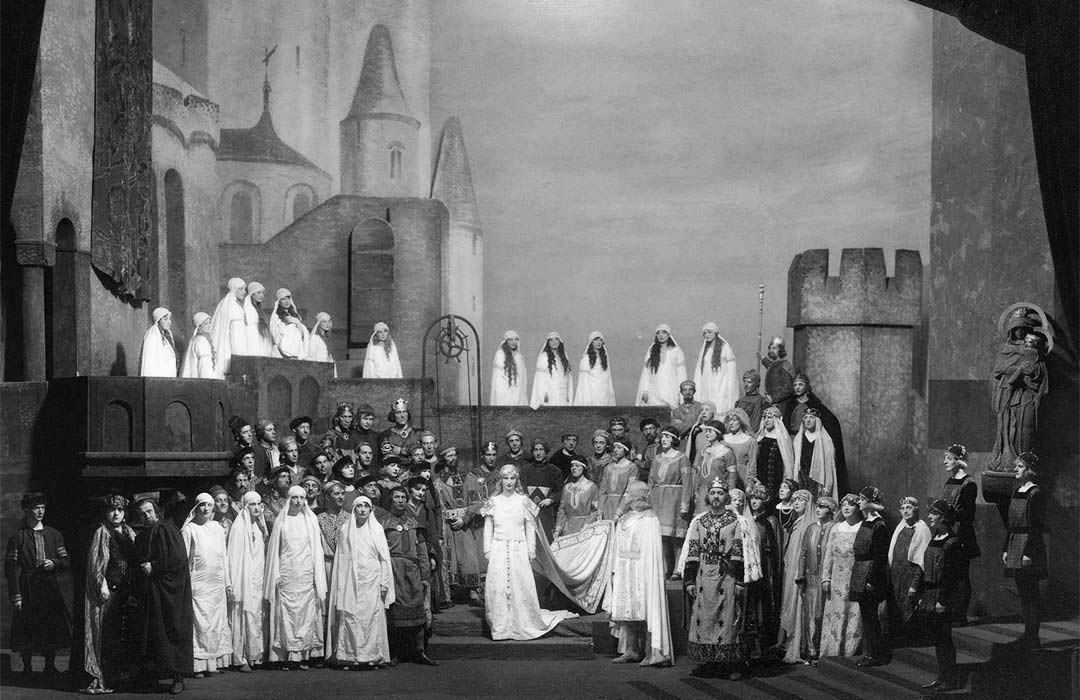Lohengrin

Kirsten Flagstad as Elsa in the Lohengrin production at the National Theatre in Oslo in 1929.
Set in Antwerp during the first half of the 10th century, Richard Wagner's opera "Lohengrin" unfolds a tale of love, betrayal, and redemption. The plot centers around Elsa, who is accused of murdering her brother, Gottfried, heir to Brabant’s Christian dynasty. Count Telramund, who has wed the malevolent Ortrud, levels this accusation against Elsa. However, it is revealed that Gottfried was not killed but enchanted by Ortrud. King Heinrich arrives in Antwerp and demands an explanation for the strife and disorder in Brabant.
Elsa dreams of a knight in shining armor who will come to her rescue. When she is called to defend herself, she prays for help, and miraculously, the knight appears. He arrives in a boat guided by a swan and pledges his loyalty to Elsa on the condition that she never questions his name or origin (“Nie sollst du mich befragen, noch Wissens Sorge tragen, woher ich kam der Fahrt, noch wie mein Nam’ und Art!”). The knight, Lohengrin, defeats Telramund in combat, vindicating Elsa's innocence and becomes her defender.
As Act II commences, Ortrud and Telramund conspire to seek revenge. Ortrud attempts to sow seeds of doubt in Elsa's mind, but Elsa responds with innocence and extends friendship to Ortrud. Meanwhile, Lohengrin is proclaimed the guardian of Brabant. Banished Telramund secretly gathers noblemen to plot against Lohengrin.
At the cathedral entrance in Act III, Ortrud and Telramund attempt to disrupt the wedding. Ortrud insinuates that Lohengrin is an impostor, and Telramund accuses him of sorcery. Elsa remains faithful despite the doubts. Later, in the bridal chamber, Elsa and Lohengrin express their love, but Elsa's anxiety leads her to inquire about his identity and origins. Before Lohengrin can answer, Telramund and his henchmen intrude, resulting in Telramund's death at Lohengrin's hand.
Lohengrin reveals that his home is the distant temple of the Holy Grail at Monsalvat (“In fernem Land”). His father is Parsifal, and Lohengrin is his name. Due to the unfolding events, Lohengrin must return to his sacred abode, leaving Elsa behind. He entrusts Elsa's brother, Gottfried, with the rule of Brabant and departs with his magical swan. Ortrud rejoices over Elsa's betrayal, but Lohengrin's prayers transform Gottfried back into human form, becoming the ruler of Brabant. Lohengrin departs, and Ortrud meets her demise. Elsa, calling for her departed husband, collapses lifeless.
Lohengrin's premiere was in 1850 with Franz Liszt conducting.
Wagner was in exile and could not attend the premiere. The first production was a disappointment, and Wagner began talking about a festival theatre built by himself, an idea that later manifested itself in the Bayreuth Festival House.

The first time Lohengrin was performed in Bayreuth was in 1894.
Lohengrin productions the first years after the world premiere in 1850
| 1850 | World premiere with Franz Liszt conducting. Wagner was in exile and could not attend the premiere. The first time Lohengrin was performed at the Bayreuth Festival was in 1894. |
| 1853 | Wiesbaden |
| 1854 | Frankfurt a.M. Leipzig Darmstadt |
| 1855 | Hamburg Hannover Köln |
| 1856 | Karlsruhe Praha Mainz Würzburg |
| 1858 | München Wien |
| 1859 | Berlin Dresden (Richard Wagner attended the production) Mannheim |
| 1860 | Danzig Königsberg |
→ In fernem Land (Lohengrin) - a selection from YouTube
Lohengrin Act 1 Prelude Timings
| 7’31” | Arturo Toscanini, NBC Symphony, 29 December 1951 |
| 7'42" | Erich Leinsdorf, Metropolitan, 2 January 1943 (CD) |
| 7’44” | Fritz Reiner, Pittsburgh Symphony, 1941 |
| 7’53” | Arturo Toscanini, NBC Symphony, 17 March + 6 May 1941 |
| 8’04” | Artur Bodanzky, Berlin State Opera Orchestra, 1927 |
| 8’05” | Arturo Toscanini, NBC Symphony, 1954 |
| 8'07” | Andris Nelsons, Bayreuth Festival, 2011 |
| 8’14” | Bruno Walter, New York Philharmonic, 1944 |
| 8’18” | Rafael Kubelik, Symphonieorch. des Bayerischen Rundfunks, 1971 |
| 8’19” | Otto Klemperer, Budapest, 1948 |
| 8'22" | Sir Adrian Boult, New Philharmonia Orchestra, 1958 (Seraphim) |
| 8'27" | Rudolf Kempe, Wiener Philharmoniker 1962-63 (CD) |
| 8’30” | Marek Janowski, Rundfunk-Sinfonieorchester Berlin |
| 8’30” | Bruno Walter, Columbia Symphony, 1959 |
| 8’30” | Fritz Reiner, Chicago Symphony, 1960 |
| 8’31” | Arturo Toscanini, NBC Symphony, 22 October 1951 |
| 8’33” | Fritz Busch, Buenos Aires, 1936 |
| 8’35” | Arturo Toscanini, New York Philharmonic,1936 |
| 8'36" | André Cluytens, Bayreuth, 23 July, 1958 (CD) |
| 8’36” | Fritz Busch, New York, 1945 |
| 8'39" | Kent Nagano, Baden-Baden, 2006 (DVD) |
| 8’45” | Fritz Busch, New York, 1947 |
| 8'50" | Sebastian Weigle, Gran Teatre del Liceu, Barcelona, 2006 (DVD) |
| 8’50” | Arturo Toscanini, NBC Symphony, 22 February 1941 |
| 9’01” | Wilhelm Furtwängler, Lucerne, 1949 |
| 9'04" | Peter Schneider, Bayreuth Festival, 1990 (DVD) |
| 9’05” | Arturo Toscanini, NBC Symphony, 1938 |
| 9’05” | Wilhelm Furtwängler, Lucerne, 1947 |
| 9’24” | Arturo Toscanini, La Scala Orchestra, 1946 |
| 9’26” | Fritz Reiner, Philadelphia Orchestra, 1932 |
| 9’35” | Wilhelm Furtwängler, Berlin, 1930 |
| 9’45” | Erich Kleiber, Copenhagen, 1953 |
| 9’45” | Karl Böhm, Vienna, 1980 |
| 9’48” | Wilhelm Furtwängler, Vienna, 1954 |
| 9’52” | Otto Klemperer, Philharmonia, 1960 |
| 9’56” | Karl Böhm,Vienna, 1965 |
| 10’02” | Artur Bodanzky, New York, 1935 |
| 10'10" | Joseph Keilberth, Bayreuth Festival, 1953 (CD) |
Sources: Jonathan Brown: Great Wagner Conductors, Per-Erik Skramstad
Lohengrin Vorspiel Act 1: Claudio Abbado
Lohengrin (Peter Konwitschny) "Was er verbirgt" (Act 2)
Peter Konwitschny’s groundbreaking production of Lohengrin set a new standard of music theatre. Thought-provoking and intelligent, it never ceases to amaze. The action takes place in a classroom.
Robert Dean Smith (Lohengrin) and Camilla Nylund (Elsa)
Royal Concertgebouw Orchestra conducted by Iván Fischer. Richard Wagner - Lohengrin, Act 3, scene 1 & 2. Concertgebouw, 29 October 2010.
Camilla Nylund - sopran (Elsa), Robert Dean Smith - tenor (Lohengrin).
→ In fernem Land (Lohengrin) - a selection from YouTube
Lohengrin productions (selected reviews)



